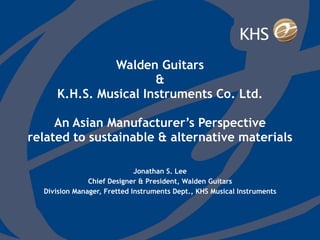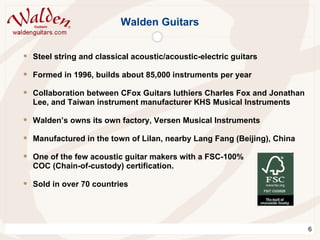Walden Guitars - Jonathan Lee
- 1. Walden Guitars & K.H.S. Musical Instruments Co. Ltd. An Asian Manufacturer¡¯s Perspective related to sustainable & alternative materials Jonathan S. Lee Chief Designer & President, Walden Guitars Division Manager, Fretted Instruments Dept., KHS Musical Instruments
- 2. Overview: Asian Manufacturing Current USA Trends by the numbers Migration of music products manufacturing to Chinese-based sources. In 1995, China accounted for 3.8% of all U.S. imports of music and audio gear. For the most recent quarter, that figure grew to 69%. Chinese-based producers accounted for 71% of all acoustic guitar imports, followed by Indonesia with an import share of 16.9%. Electric guitar imports from China accounted for 56% of total figures. Chinese-produced acoustic pianos accounted for 37% of the market for the most recent quarter, up slightly from last year's figure of 35%. Stringed instruments from China now account for?93% of the market. Across the entire spectrum of school music products, Chinese producers now account for 76% of all imports. Compared to the year earlier period, average import values per unit increased substantially for nearly all goods produced in China. The combination of surging wages coupled with a declining U.S. dollar and increasing commodity prices contributed to these average unit price increases: Acoustic Guitars +11.2%; Electric Guitars +9.7%; Drumsets +14%; and Grand Pianos +6.3%. (source: The Music Trades AUG2011)
- 3. Today¡¯s manufacturing base: Primarily Indonesia & China Historically ? Korea / Taiwan ? Japan ? Copies of USA / Spain Low barrier to entry, therefore, many factories with various Asian ownership structures and business models Mostly OEM manufacturers Extremely price competitive & driven by market requirements Requiring and resulting in compromised instruments Often requiring compromised conditions Limited number of material suppliers Many suppliers sources are suspect Overview Asian Guitar Manufacturing
- 4. K.H.S. Musical Instruments Co., Ltd The KHS Group began in 1930. The company has sought to dedicate itself to the education field and focus on servicing our society. The meaning of KHS, ¡° Kong Hsue Sheh ,¡± translates to "contribute to schools and society¡± and expresses the group¡¯s commitment to enhancing human quality of life and culture. It is currently amongst the Global ¡°Top 10¡± musical instrument companies. 1956 KHS Began building harmonicas 1957 Wind instruments begun 1969 Yamaha piano production 1985 Jupiter Band Instruments established in USA 1990 ?Altus built in Japan 1994 Ross Mallet Instruments acquired 1995 Joint Venture with Versen Musical Instruments 1996 Mapex USA established 2003 Majestic Holland B. V. joins KHS Group 2010 KHS America established in Nashville, TN.
- 5. KHS Brands KHS Musical Instrument Brands and Manufacturing Foundation Jupiter Band Instruments Mapex Drums Hercules Stands Walden Guitars Altus Flutes Majestic Concert Percussion
- 6. Steel string and classical acoustic/acoustic-electric guitars Formed in 1996, builds about 85,000 instruments per year Collaboration between CFox Guitars luthiers Charles Fox and Jonathan Lee, and Taiwan instrument manufacturer KHS Musical Instruments Walden¡¯s owns its own factory, Versen Musical Instruments Manufactured in the town of Lilan, nearby Lang Fang (Beijing), China One of the few acoustic guitar makers with a FSC-100% COC (Chain-of-custody) certification. Sold in over 70 countries Walden Guitars
- 7. Walden Activities Introduced the Walden Madera Line of FSC-100% acoustic guitars in 2008. Currently the only certified Asian made guitar, and one of only 2 guitar makers building an FSC-100% acoustic guitar. Worked with TFT (The Forest Trust) in 2010 & 2011 to perform a GAP Analysis and Risk Assessment of KHS¡¯s supply chain. Hoped to transfer sourcing to TFT VLO (Verified Legal Origin) network where possible. Currently identifying suppliers who can provide certified materials REACH compliance (EU) CARB compliance (California, USA) Operate in a fair, safe, legal, and humane way Support the local economy
- 8. Walden¡¯s Madera Line MADERA Line of FSC-100% instruments (2008) 100% FSC certified, responsibly forested traditional tonewoods Madera guitars are the most affordable eco-friendly acoustic guitars in the world Walden is one of only 2 major acoustic guitar makers producing a FSC-100% instrument. Central-American Mahogany Sitka spruce Western Red Cedar Katalox (Mexican Ebony)
- 9. Expanding sourcing for FSC-100% materials and other certified material sources Natural Fiber Composites and Other Synthetics Flaxwood Richlite Phenolic ¡° FRP¡± ¨C fiberglass ¨C resin formulations Wood alternatives to typical tonewoods Bamboo Certified Pine Certified Santos / Pau Ferro Certified Ebony Certified Western Red Cedar Certified Sitka spruce Certified European spruce Other certified woods (Maple, Birch, Walnut, etc.) Verified Legal Origin tonewoods A balanced approach to Sustainable & Alternative Material Testing & Sourcing
- 10. Challenges: Market Currently primarily desired by ¡°early adopters¡± Does the mass market want them? Primarily a push market & driven by manufacturers. Predetermined idea of ¡°voice¡± Consumers lack awareness of certification schemes The dream of the ¡°¡¯57 this,¡± the ¡°Pre-war that,¡± the ¡°Gold top,¡± etc. Consumer resistance to synthetics Dealers don¡¯t see the demand, nor do many want to work for the sale Competition¡¯s race to the bottom
- 11. Challenges: Supply Tonewoods & tone materials need to exhibit specific sonic and stability properties ¡° Responsibly forested¡± certified material either in short supply or underdeveloped Verified Legal Origin materials for musical instrument making not available Musical instruments require exceptional quality & specific milling techniques Many alternative woods either not sonically adequate or stable, or, are in short supply Synthetics that satisfy sonic requirements often cost more than the wood it replaces Size of music instrument makers & Industry size as a whole is small: Limits our leverage.
- 12. Challenges: Natural Fiber based Composites Injection mold NFC requires high capacity mass production Cost per part Synthetic element (plastic) does not have a desirable reputation Increasing attractiveness to consumer requires outreach and education Certification helps to underscore part of the message Tonal characteristics different than the wood it is replacing
- 13. We might as an industry be pushed into it (and its not a bad thing): Due to Resource reduction / destruction Due to Laws and enforcement NGO Organizations like FSC, TFT, Greenpeace, etc. need improved outreach & marketing Coalitions to incentivize mills and forests: Manufacturers, Music Associations, Governments, etc. Creating consumer desire through artists vocal endorsement NFC ¡°blanks¡± that are more globally useful Where do we go from here? Some Suggestions
- 14. Thank You Q & A













